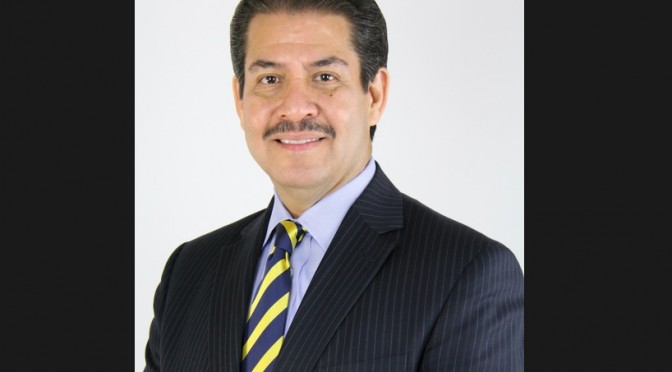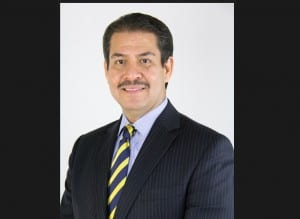In the Sixteenth installment of the 2015 Texas Leftist Candidate Questionnaire we hear from Hon. Adrian Garcia, former Harris County Sheriff and candidate for Mayor of Houston.
Please note: Responses are directly from the candidate, and have been posted ver batim from the email received. This is done out of fairness to all candidates. Publishing these responses does not constitute an endorsement, but may be considered during the endorsement process.
TL: What is your name, as it will appear on the ballot?
AG: Adrian Garcia
TL: Are you a current or former elected official? If so what office(s)?
AG: Houston City Council; Harris County Sheriff
TL: As a political candidate, you clearly care about what happens in certain levels of government. In your own words, why is government important?
AG: I am living proof of the promise of Houston, where if you work hard and play by the rules, you can get anywhere you are bold enough to dream. My career has taught me the importance of listening to the needs of all communities and how we can make our City government work efficiently to serve Houstonians with a great quality of life today, while building our infrastructure for tomorrow. Government is important to ensure that all Houstonians have the opportunity to pursue their dreams. This city has been very good to me, and I want to make sure it remains as the city of opportunity to the next generation of Houstonians. I am uniquely qualified and passionate to be the next great mayor of this great city.
TL: If elected, what is your top priority in office for the upcoming term? Describe how you plan to accomplish it.
AG: Our most significant challenge is our overall city finances. We have been operating a structurally unbalanced system for too long. The biggest driver of this issue is our unpaid pension obligations. While I strongly believe that we must keep our promises to current retirees and employees so that they know their retirement is secure, I believe we need to take a holistic look at all of the city finances, including pensions, to find an efficient Houston solution going forward. Some people approach the pensions as three silos outside of the city’s finances, but I feel that such an approach misses the opportunity to redefine how our pension obligations play a role in our overall city finances. Local control, reduction of the COLA adjustment, a realistic rate of return, review of the DROP and balancing representation on the pension boards will all be explored in a plan for reform.
My whole career has been committed to public safety, and, as an HPOPS retiree, I have personal skin in the game when it comes to any pension negotiations. I am committed to bringing all parties to the table to craft a local solution that allows for the City to keep its promises to public employees while still maintaining critical infrastructure and the hiring of the public safety personnel we need to keep Houston safe.
TL: After decades of deferred maintenance and neglect, Houston’s infrastructure is in a critical state of disrepair. Ask any driver, cyclist or pedestrian, and they can readily tell you that city streets and sidewalks are crumbling… some to the extent that they pose significant danger to those that would traverse them. The Parker Administration has attempted to address the problem by the voter-approved ReBuild Houston program. Knowing that the next Mayor has no choice but to invest in city infrastructure, do you support the continuation of ReBuild Houston? If yes, please explain why. If no, please explain how you would address our copious infrastructure needs differently.
AG: I believe the ReBuild Houston program is an important part of our city’s approach to addressing our street and drainage infrastructure issues. It is a good program that has been poorly managed. I believe there is unnecessary confusion among stakeholders and the public regarding the program. If elected, I would implement a number of reforms including, but not limited to:
● More transparency in how the money is being used
● More frequent updates on the financials of the program
● Allow for more flexibility in our CIP/needs-based evaluation process for projects
● Incorporate regional detention into the program if possible
● Public meetings and access for the project decision meetings process so staff can justify the “worst first” approach findings that the ordinance requires.
Additionally, I believe there are efficiencies to be gained and savings to be had in a comprehensive review of the Public Works & Engineering (PWE) department. Savings could then be reprogrammed into more projects that are sorely needed across the city.
TL: At present, the city of Houston has one of the strongest forms of “strong-Mayor governance” in the state of Texas, to the point that the Mayor alone decides what business comes before City Council. If elected, would you support an amendment to the City Charter that would allow any coalition of 6 Council Members to place items on the Council Agenda without prior approval from the Mayor? Whether yes or no, please explain your answer.
AG: I am someone who strongly believes in a participatory system. The City of Houston and its departments provide needed services for our residents, and the residents should therefore have a voice. If there is a more effective and efficient way to make this happen than the current structure than I will be happy to consider it. I am open to hearing and working on suggestions for how we can make processes work better, so that the voices of our all residents can be heard in City Council.
TL: If elected, would you support and seek to continue the current administration’s Complete Streets policy, which establishes that any new or significant re-build of city streets will work to prioritize and incorporate safe access for all road users, including pedestrians, persons with disabilities and cyclists?
AG: I am strong supporter of “Complete Streets” policy. As we make continued investments in multi-modal transportation, we must also effectively market and promote the use of those investments we have already made. I am confident that once an individual uses a safe and convenient alternative means of transportation, they will use it again. For those that already use alternative forms of transportation, we must ensure that we are able to keep them safe by building an infrastructure that embraces vision zero and by educating the public about operating along “complete streets,” parks and trails.
TL: What makes you the best candidate for this office?
AG: As the only native-born American in my family, and as a lifelong Houstonian, I am asking for the privilege of becoming the mayor of my great hometown. This city has been very good to me, and I want to make sure it remains as the city of opportunity to the next generation of Houstonians. I believe I am uniquely qualified to lead the City of Houston because I’m the only candidate in this race with executive experience. I lead, managed, and reformed a major organization, the Harris County Sheriff’s Office, into savings of over $200 million dollars while keeping the streets of America’s 3rd -largest county safe. Throughout my entire tenure at the HCSO, I promoted diversity in hiring and a professional environment of mutual respect and trust, so that the Sheriff’s Department could best protect all residents in the most diverse and culturally rich county in America.
My nearly 35 years in public service, starting as a patrol officer with the Houston Police Department, taught me a great deal about our government. From the front seat of a patrol car, you get a first-hand look at where our City is serving its residents and where it is failing to provide the services it should. My efforts to decrease gang involvement, a major national issue at that time, prompted Mayor Bob Lanier to appoint me to the Mayor’s Anti-Gang Office in 1994, and within 5 years I was promoted to be the director of the program. Our efforts were tremendously successful in decreasing the gang violence plaguing Houston neighborhoods through employing creative community policing initiatives, which were centered on building trusting relationships between the patrolling officers and the community.
I then took the skills that I learned as a police officer and directed them towards addressing the broader needs of our community by being elected to a seat on the Houston City Council, where I served three terms. Serving on the Council as Bill White’s Mayor Pro tem, I helped develop and pass initiatives expanding senior homestead exemptions and making homeownership more affordable because experience had taught me that neighborhoods are stronger when people can own their own homes. I had also learned from my experience as an officer that more crime could be prevented with a greater focus on timely data collection and analysis. This led me to work on creating HPD’s Real Time Crime Center, which produced immediate results in lowering crime rates. While I was an ardent supporter of METRO lightrail expansion as a councilmember, I listened carefully to the concerns of many residents about the new rail lines. Hearing concerns about the rail construction impact on longtime area businesses, I created the city’s Construction Mitigation Program to extend low interest loans to existing micro businesses who needed a little help to get through the disruptive construction period of a major infrastructure project. Throughout my tenure on City Council, I worked tirelessly and collaboratively to tackle major issues like crime prevention while also supporting the kinds of smart infrastructure and economic development initiatives that helped make Houston even greater.
Voters then awarded me the honor of leading a Sheriff’s Office of almost 5,000 personnel and a budget of roughly $500 million, and in dire need of new leadership and reform. When I arrived on my first day, the Harris County Sheriff’s Office was $60 million over- budget, and the county jail so overcrowded that taxpayers were paying over $10 million annually to house prisoners in Louisiana. By demonstrating leadership and establishing reforms aimed at progressive community policing, I was able to keep a lid on crime while delivering four straight fiscal years under-budget. I was also able to dramatically lower our jail population and stop sending prisoners out of state by developing programs and partnerships to make sure that our mentally-ill Houstonians began receiving the treatment they needed.
I am living proof of the promise of Houston, where if you work hard and play by the rules, you can get anywhere you are bold enough to dream. My career has taught me the importance of listening to the needs of all communities and how we can make our City government work efficiently to serve Houstonians with a great quality of life today, while building our infrastructure for tomorrow.
TL: When not on the campaign trail, how do you like to spend your free time?
AG: I really enjoy being in the community and get immense satisfaction from volunteering. When I’m not doing that you’ll find me with my family and likely running or biking through our beautiful parks and bayous.
Thanks to Sheriff Garcia for the responses.
Election Day 2015 is Tuesday November 3rd, and Early Voting runs from October 19th through October 30th. Check out this year’s Harris County Early Voting information for locations and times.

